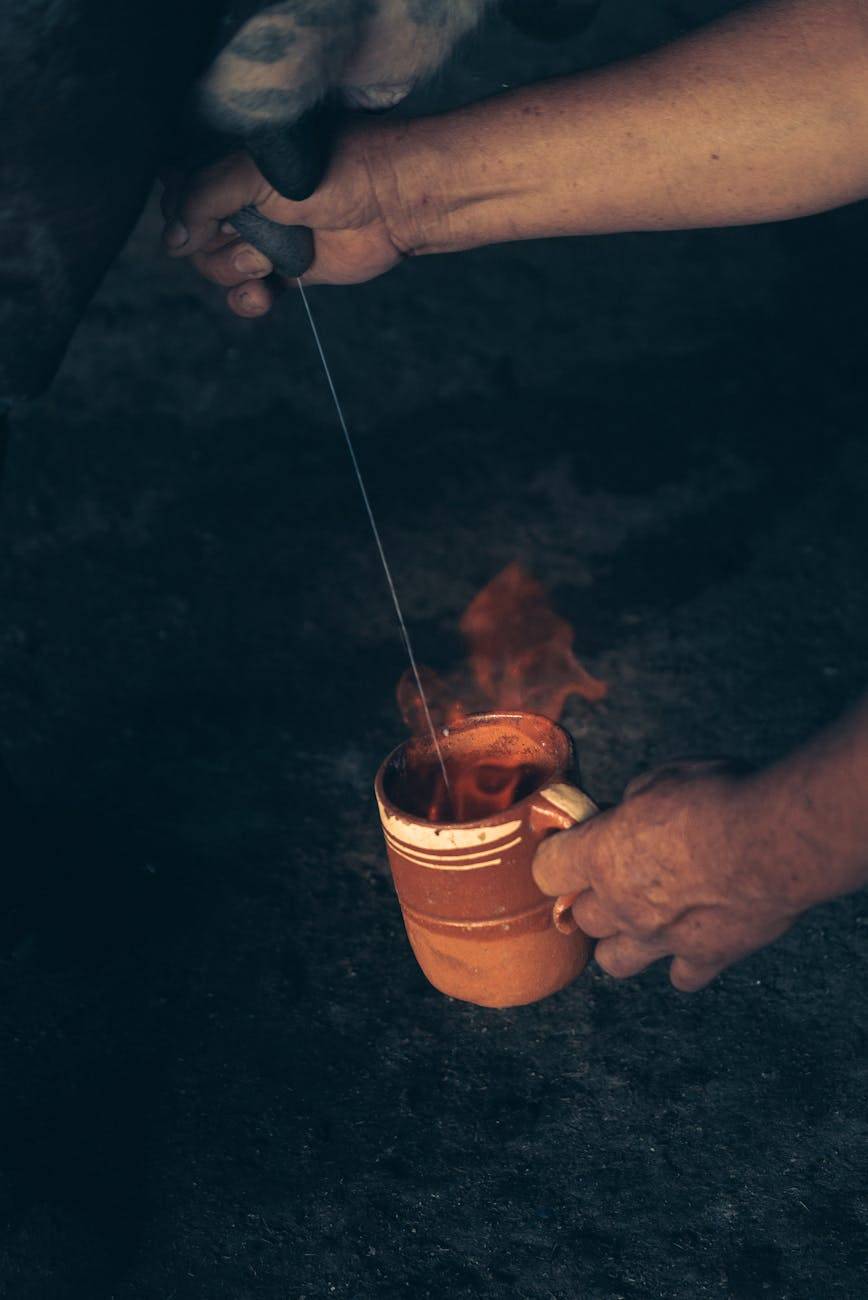Understanding Raw Milk
Navigating the dairy aisle can be quite a task, especially with the numerous options available. One variant that has been gaining attention is raw milk. Let’s explore what raw milk is and delve into its benefits and risks.
Defining Raw Milk
Raw milk refers to milk that has not been pasteurized, which is the process of heating the milk to a high temperature to kill harmful bacteria. This makes the milk completely natural, fresh, and unprocessed. It’s similar to breastmilk in terms of its composition and contains essential nutrients, fats, proteins, anti-inflammatory and digestive enzymes, bioavailable vitamins, and minerals in a form that is easily utilized by the body.
Benefits and Risks of Raw Milk
Some people believe that raw milk is healthier and more nutritious compared to pasteurized milk, as it contains beneficial bacteria and enzymes that are destroyed during pasteurization. It also facilitates the production of lactase enzyme in the intestinal tract, allowing many lactose intolerant individuals to digest raw milk without issues (Raw Milk Institute).
Nevertheless, it’s also important to consider the potential risks that come with consuming raw milk. Raw milk can contain harmful bacteria such as Salmonella, E. coli, and Listeria, which can cause severe illness or even death.
In conclusion, while raw milk can offer nutritional benefits, it also carries potential risks. Therefore, individuals should make an informed decision about consuming raw milk, considering both its benefits and risks.
Looking to get your hands on raw milk? Check out our raw milk finder to locate a raw milk farm near me.
Legalities of Raw Milk Sales
Understanding the legalities of raw milk sales is crucial for those seeking to find a milk farm near me. The regulations differ between countries and even within states or provinces. Here, we will discuss the regulatory framework in the U.S. and Canada.
State Regulations in the U.S.
In the United States, the sale of raw milk is not governed by a federal law but rather by individual states. Some states permit the sale of raw milk in retail stores, while others only allow it to be sold directly on the farm where it is produced. This variance in regulations can make it challenging for consumers looking to buy raw milk, and it is essential to familiarize oneself with local laws before making a purchase. If you’re unsure about the regulations in your state, our raw milk finder can provide helpful information.
Regulations in Canada
In contrast to the U.S., Canada has a more uniform approach to raw milk sales. Canadian dairy farmers have been following mandatory food safety requirements since 2015. These regulations are recognized by the Canadian Food Inspection Agency for their rigor and strength.
These regulations require dairy farmers to apply food safety management practices on their farms using a science-based, preventative approach, based on the principles of the internationally known Hazard Analysis Critical Control Points (HACCP) system. These practices include establishing standard operating procedures (SOPs) to enhance food safety on their farms, such as procedures to minimize the risk of accidental contamination of milk (Dairy Farmers of Canada).
These rigorous standards ensure the quality and safety of milk produced in Canada (Dairy Farmers of Canada).
Whether you’re searching for a raw milk farm near me in the U.S. or Canada, it’s crucial to understand the legalities of raw milk sales. This understanding will guide you in making informed decisions and ensure you adhere to local regulations while enjoying the rich, natural flavor of raw milk.
Finding Local Raw Milk Farms
For those seeking to incorporate raw milk into their diet, finding a local milk farm can be an exciting journey. Whether you are looking for organic raw milk, or simply want to know where to buy raw milk near you, this section covers various resources to help you find the perfect dairy farm.
Online Resources for Finding Farms
One of the most effective ways to locate a local milk farm near you is by leveraging online resources. Websites such as GetRawMilk.com allow users to find raw milk farms by entering their location. This website even allows users to find raw milk near Cincinnati, OH.
For those looking for a more interactive experience, our raw milk finder allows users to search for raw milk farms, and offers additional information such as reviews, product availability, and contact information for the farms.
Noteworthy Raw Milk Farms
There are numerous noteworthy raw milk farms across the country that pride themselves on producing high-quality, organic raw milk. For instance, the Straus Family Creamery is a certified organic dairy farm located in Northern California that is well-known for its commitment to sustainability and quality.
Another excellent example is the Shenandoah Valley Family Farms. This group of Certified Organic small dairy farms in Dayton, VA is dedicated to responsible stewardship of the planet, life, and land in their care. They offer Grade A, non-homogenized (cream on top) whole milk in Organic, A2, and Vat Pasteurized options. Their milk is 100% grass-fed without GMOs or growth hormones.
Similarly, Mountain Branch Creamery, located in the heart of the Shenandoah Valley, is a family farm owned and operated by Wayne and Annie Beery. The creamery produces “cow to carton” milk and cheese that is processed right on the farm and is high in CLAs, omega 3 fatty acids, and proteins.
These are just a few examples of the numerous raw milk farms that exist across the country. It’s important to carry out thorough research and visit various farms to find the one that best meets your needs. Remember, purchasing raw milk is not just about the product, but also about supporting local farmers and sustainable farming practices. So, go ahead and start your journey to find the perfect milk farm near me.
Considerations When Buying Raw Milk
Choosing to buy raw milk is a personal decision that should be made with careful thought and consideration. There are several factors to consider, including health and safety precautions and the right questions to ask your farmer.
Health and Safety Precautions
Raw milk refers to milk that has not been pasteurized. This means it hasn’t undergone the process of heating to high temperatures to kill harmful bacteria. While it does have its benefits, such as being completely natural, fresh, and unprocessed, it also carries potential risks. One of the major concerns is that raw milk can contain harmful bacteria such as Salmonella, E. coli, and Listeria, which can cause severe illness or even death.
As such, it’s crucial to consult with a healthcare professional before consuming raw milk. This is particularly important for individuals with weakened immune systems, young children, pregnant women, and the elderly, who are at higher risk of experiencing severe complications from consuming raw milk (Healthline).
For those who choose to consume raw milk, it’s essential to ensure it’s from a reliable source. Check out our raw milk finder to locate a reputable milk farm near me.
Questions to Ask Your Farmer
When buying raw milk, it’s important to know the right questions to ask your farmer. This can help you understand more about their practices and the quality of the milk they produce. Here are a few questions to consider:
- What breed of cows do you have and what is their diet?
- How do you ensure the health of your cows?
- What are your milking practices?
- How do you clean your milking and storage equipment?
- How often do you test your milk for pathogens?
- Do you have any certifications or inspections?
By asking these questions, you can ensure you’re making an informed decision about the raw milk farm near me you choose to buy from.
Remember, raw milk can be a nutritious addition to your diet, but it’s essential to ensure it’s from a trusted source. For more information, explore our resources on where to buy raw milk, raw milk delivery near me, and organic raw milk near me.
Quality and Production Standards
When you’re embarking on the journey to find a local milk farm near you, understanding the quality and production standards of these farms is key. This includes the food safety measures in place and the farms’ commitment to environmental sustainability.
Food Safety Measures
In many regions, such as Canada, dairy farmers follow mandatory food safety requirements, recognized by food inspection agencies for their rigour and strength.
Farmers apply food safety management practices using a science-based, preventative approach, based on the principles of the internationally known Hazard Analysis Critical Control Points (HACCP) system. Additionally, dairy farms are regularly inspected to ensure compliance with these standards (Dairy Farmers of Canada).
Here are some of the key food safety measures followed on dairy farms:
- Standard Operating Procedures (SOP): Farmers establish SOPs to enhance food safety, including procedures to minimize the risk of accidental contamination of milk (Dairy Farmers of Canada).
- Temperature Control: All milk is stored between 1 and 4 degrees Celsius in stainless steel bulk tanks on the farm to minimize the growth of harmful bacteria.
- Antibiotic Use: Dairy farmers take measures to protect the safety of the milk supply, including ensuring the safe and prudent use of antibiotics (Dairy Farmers of Canada).
Environmental Sustainability
Beyond food safety, environmental sustainability is another crucial aspect of dairy farming. Canadian dairy farmers are committed to preserving the environment, and they take measures to minimize their impact on the environment.
From practicing responsible water usage to managing waste effectively, farmers aim to maintain a balance between efficient production and environmental conservation. As a consumer, supporting farms that prioritize sustainability contributes to the preservation of our environment.
Before you buy raw milk, consider the farm’s commitment to quality and production standards. Whether you’re looking for organic raw milk or exploring raw milk delivery options, it’s important to choose a farm that values food safety and environmental sustainability. Ensure you’re well informed about these standards as you look for the perfect raw milk farm near you.
Role of Dairy Farms in the Community
Dairy farms play a significant role in the local community, not just as providers of fresh, local produce but also as contributors to the local economy and as family-run establishments that often form the backbone of rural communities.
Economic Contribution
The economic impact of dairy farms in the community is substantial. According to the USDA, the top five milk-producing states in 2019 were California, Idaho, New York, Texas, and Wisconsin, which produced over 50% of the country’s milk. In 2019, 218,382 million pounds of milk were produced in the US. This immense production volume speaks volumes about the economic contribution of dairy farms. They not only provide employment opportunities but also contribute to the state’s revenue, making them a vital part of the local economy.
| Top 5 Milk Producing States | Percentage of Total US Milk Production |
|---|---|
| California | 18.5% |
| Idaho | 7.5% |
| New York | 7.0% |
| Texas | 6.8% |
| Wisconsin | 14.2% |
Family-Owned Businesses
The majority of dairy farms, particularly those offering raw milk, are family-owned and operated. According to Dairy Farmers of Canada, Canadian dairy farmers are committed to environmental sustainability and take measures to minimize their impact on the environment. As family businesses, these farms often have a deep-rooted sense of community, with generations of knowledge and love for dairy farming.
This dedication to community, quality, and sustainability ensures that when you’re searching for a ‘milk farm near me’, you’re not simply buying a product. You’re supporting a local family business and contributing to your local economy. You’re also investing in the preservation of traditional farming methods and the production of high-quality dairy products.
So next time you’re looking for raw milk near me or a raw milk farm near me, remember the vital role these farms play in your community. By supporting them, you’re supporting your local economy and a family-owned business, all while enjoying the wholesome goodness that comes from their hard work and dedication.
From Cow to Consumer
Understanding how milk travels from a cow to your home is an important aspect of your dairy consumption knowledge. This process, which involves various stages of production, transportation, and storage, ensures the milk you consume is fresh, safe, and of high quality.
Milk Production Process
The milk production process starts in the dairy farm, where cows are milked. The United States has a large dairy industry, with the top five milk-producing states in 2019 being California, Idaho, New York, Texas, and Wisconsin. These states produced over 50% of the country’s milk.
In 2019, there were 9,336 milk cows in the United States, with most being Holsteins. Jersey cows and other crossbreeds are also used. Each cow produced an average of 23,391 pounds of milk.
Transportation and Storage of Milk
After the milk is produced, it is stored in refrigerated vats or silos. These storage units come in various shapes and sizes, and they keep the milk at or below 39 degrees Fahrenheit. The milk can be stored on the farm for no more than 48 hours.
Milk is collected from the farm every 24 or 48 hours by tankers. These tankers have special stainless steel bodies and are heavily insulated to keep the milk cold during transportation to the processing factory.
Upon arrival at the factory, samples from the bulk milk tanker are tested for antibiotics and temperature. Meanwhile, farm milk samples are tested for milkfat, protein, bulk milk cell count, and bacteria count (ProCon).
If you’re interested in learning more about where to buy raw milk near you, check our raw milk finder or visit our raw milk farm page. If you like to have your milk delivered, check out our raw milk delivery options.




Leave a Reply